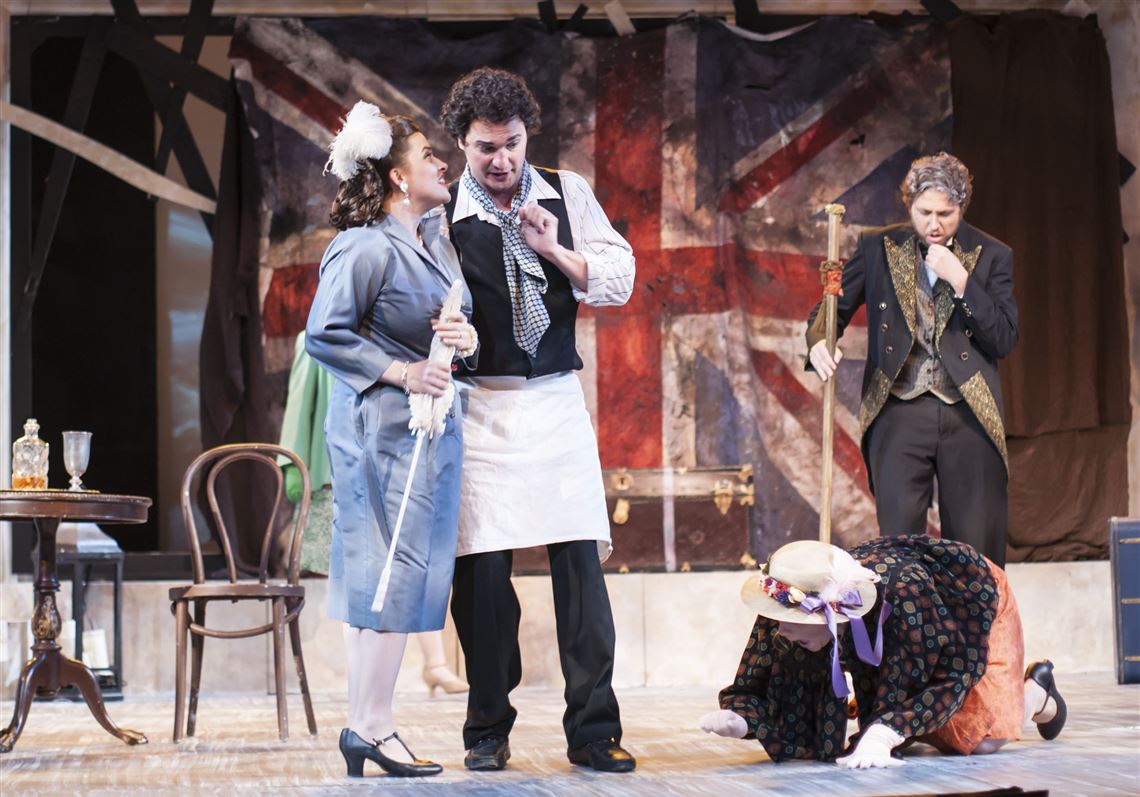Late in his life, composer Richard Strauss said “The Silent Woman” was his beloved opera that was “clapped into a concentration camp.”
His librettist of choice, Hugo von Hofmannsthal, had died in 1929, and for a new opera, Strauss turned to writer Stefan Zweig, who was Jewish. Despite difficulties with the Nazi regime, Strauss fought and eventually got permission from Hitler himself to produce the opera in Dresden in 1935 and to include Zweig’s name on the program.
It was a pyrrhic victory, however. The Nazi regime banned the work, known as “Die schweigsame Frau” in German, after four performances. The opera was not revived until 1946. New York City Opera gave the American premiere in 1958, and Santa Fe (which specializes in Strauss) produced it in 1987 and 1991, but performances are still rare.
This weekend, thanks to underwriting by retired Duquesne University professor and inveterate Strauss lover Jerry Clack, Pittsburgh’s Opera Theater SummerFest will offer two performances on Friday and Sunday of this sparkling comedy. Judging by a dress rehearsal on Wednesday in Winchester Thurston School’s comfortable, sleek Falk Auditorium in Shadyside, this Pennsylvania premiere, in a clear, succinct English translation derived from the Glyndebourne Festival, is a singular opportunity to see an unjustly neglected minor masterpiece.
Zweig based his libretto on Ben Jonson’s 1609 comedy, “Epicoene,” but also incorporated elements of Donizetti’s popular Italian opera buffa, “Don Pasquale.” The plot centers on the aged Sir Morosus, who cannot bear loud noise or even music. He disinherits his nephew Henry, who has married an opera singer, Aminta, and has joined her troupe. Then he — Sir Morosus — decides to look for a silent (and obedient) wife.
Egged on by the old man’s barber (a Figaro clone), Henry and the opera company members arrange a fake marriage, in which a disguised Aminta pretends to be silent and meek until after the wedding. Then, starting with an earsplitting high C, she makes the old man’s life so miserable that he begs for a divorce. It’s significant that Strauss’s characters are kinder, more sympathetic than their counterparts in Jonson’s play or Donizetti’s opera. Morosus is kindly towards Aminta, who adapts her shrewish persona reluctantly, and the old man forgives the couple after he learns the truth.
“The Silent Woman” is one of Strauss’s most engaging scores, sometimes called a “grand operetta,” with spoken passages to carry the action forward. It’s sophisticated, teasing opera aficionados with fragments from Monteverdi and Rossini, Wagner and Gounod. It’s also very complex, making high technical demands on singers and instrumentalists alike. Special praise must go to conductor Brent McMunn and his hard-working 24-piece orchestra.
Staged in ebullient fashion by Opera Theater’s artistic and general director Jonathan Eaton, this show is great fun. Mr. Eaton has a genius for staging scenes of mayhem with a discipline that makes the chaos on stage appear to be logical — notably in the actions of Henry’s motley crew of opera buddies.
It’s unfair to judge individual performers on the basis of a rehearsal, but it’s not hard to single out Jeremy Galyon for his richly vocalized, superbly defined impersonation of Sir Morosus. Mr. Galyon’s deep bass voice and booming solid low notes would be an asset to any opera company, and his subtle delineation of the character’s changing emotional states is the work of a mature artist. Ending on a sustained low E-flat, his final soliloquy — which includes the line, “How beautiful music is, but even more beautiful, when it’s over” — is a real gem.
Also evident in rehearsal were Julia Fox’s ease with Aminta’s excursions into the vocal stratosphere and Dimitrie Lazich’s comfortable stage demeanor as the barber, the catalyst figure for all the plot proceedings.
Robert Croan is a Post-Gazette senior editor.
First Published: July 21, 2016, 3:57 p.m.
Updated: July 21, 2016, 3:57 p.m.

















